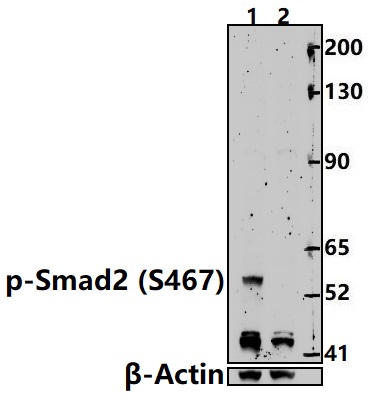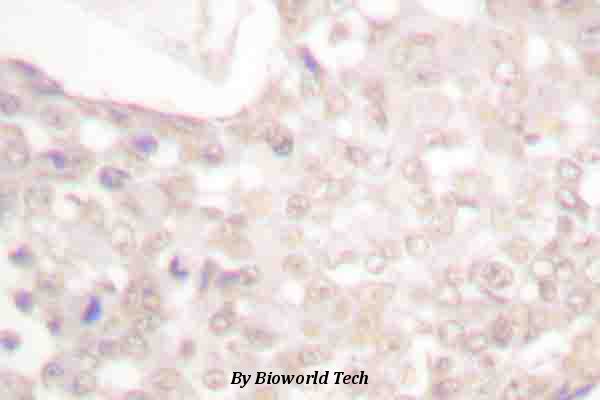Product Name :
Smad2 (phospho-S467) polyclonal antibody Background :
Smad proteins, the mammalian homologs of the Drosophila mothers against decapentaplegic (Mad), have been implicated as downstream effectors of GFβ/BMP signaling. Smad1 (also designated Madr1 or JV4-1) and Smad5 are effectors of BMP-2 and BMP-4 function, while Smad2 (also designated Madr2 or JV18-1) and Smad3 are involved in TGFβ and activin-mediated growth modulation. Smad4 (also designated DPC4) has been shown to mediate all of the above activities through interaction with various Smad family members. Smad6 and Smad7 regulate the response to activin/TGFβ signaling by interfering with TGFβ-mediated phosphorylation of other Smad proteins. Product :
Rabbit IgG, 1mg/ml in PBS with 0.02% sodium azide, 50% glycerol, pH7.2 Storage&Stability :
Store at 4°C short term. Aliquot and store at -20°C long term. Avoid freeze-thaw cycles. Specificity :
p-Smad2 (S467) polyclonal antibody detects endogenous levels of Smad2 protein only when phosphorylated at Ser467. Immunogen :
Synthetic phosphopeptide derived from human Smad2 around the phosphorylation site of Serine 467. Conjugate :
Unconjugated Modification :
Phosphorylated
Smad2 (phospho-S467) polyclonal antibody Background :
Smad proteins, the mammalian homologs of the Drosophila mothers against decapentaplegic (Mad), have been implicated as downstream effectors of GFβ/BMP signaling. Smad1 (also designated Madr1 or JV4-1) and Smad5 are effectors of BMP-2 and BMP-4 function, while Smad2 (also designated Madr2 or JV18-1) and Smad3 are involved in TGFβ and activin-mediated growth modulation. Smad4 (also designated DPC4) has been shown to mediate all of the above activities through interaction with various Smad family members. Smad6 and Smad7 regulate the response to activin/TGFβ signaling by interfering with TGFβ-mediated phosphorylation of other Smad proteins. Product :
Rabbit IgG, 1mg/ml in PBS with 0.02% sodium azide, 50% glycerol, pH7.2 Storage&Stability :
Store at 4°C short term. Aliquot and store at -20°C long term. Avoid freeze-thaw cycles. Specificity :
p-Smad2 (S467) polyclonal antibody detects endogenous levels of Smad2 protein only when phosphorylated at Ser467. Immunogen :
Synthetic phosphopeptide derived from human Smad2 around the phosphorylation site of Serine 467. Conjugate :
Unconjugated Modification :
Phosphorylated
-
 Western blot (WB) analysis of Smad2 (phospho-Ser467) polyclonal antibody at 1:500 dilution Lane1:HepG2 treated with TGF-β(100 ng/ml,30 minutes) whole cell lysate(30ug) Lane2:HepG2 whole cell lysate(30ug)
Western blot (WB) analysis of Smad2 (phospho-Ser467) polyclonal antibody at 1:500 dilution Lane1:HepG2 treated with TGF-β(100 ng/ml,30 minutes) whole cell lysate(30ug) Lane2:HepG2 whole cell lysate(30ug) -
 Immunohistochemistry (IHC) analyzes of p-Smad2 (S467) pAb in paraffin-embedded human breast cancer tissue.
Immunohistochemistry (IHC) analyzes of p-Smad2 (S467) pAb in paraffin-embedded human breast cancer tissue.
Hydrogen Sulfide Donor GYY4137 Protects against Myocardial Fibrosis
PMCID: Pubmed No.:26078813
Prostaglandin E2 promotes liver cancer cell growth by the upregulation of FUSE-binding protein 1 expression
PMCID: Pubmed No.:23338277
Augmenter of liver regeneration ameliorates renal fibrosis in rats with obstructive nephropathy
PMCID: Pubmed No.:24844766
Prostacyclin Analogue Beraprost Inhibits Cardiac Fibroblast Proliferation Depending on Prostacyclin Receptor Activation through a TGF β-Smad Signal Pathway
PMCID: Pubmed No.:24852754
Augmenter of liver regeneration inhibits TGF-β1-induced renal tubular epithelial-to-mesenchymal transition via suppressing TβR II expression in vitro
PMCID: Pubmed No.:25092350
Roles of TGF-β/Smad signaling pathway in pathogenesis and development of gluteal muscle contracture
PMCID: Pubmed No.:25207745
Maternal low-protein diet affects myostatin signaling and protein synthesis in skeletal muscle of offspring piglets at weaning stage
PMCID: Pubmed No.:25266448
Anti‑fibrotic effects of Acremoniumterricola milleretal mycelium on immunological hepatic fibrosis in rats
PMCID: Pubmed No.:25270983
Astragalus and Paeoniae radix rubra extract inhibits liver fibrosis by modulating the transforming growth factor‑β/Smad pathway in rats
PMCID: Pubmed No.:25373883
Hydrogen Sulfide Donor GYY4137 Protects against Myocardial Fibrosis
PMCID: Pubmed No.:26078813
Curcumin inhibits cobalt chloride-induced epithelial-to-mesenchymal transition associated with interference with TGF-β/Smad signaling in hepatocytes
PMCID: Pubmed No.:26302188
Hoxc13 is a crucial regulator of murine hair cycle
PMCID: Pubmed No.:26553656
Augmenter of liver regeneration inhibits TGF-β1-induced renal tubular epithelial-to-mesenchymal transition via suppressing TβR II expression in vitro
PMCID: Pubmed No.:25092350
Roles of TGF-β/Smad signaling pathway in pathogenesis and development of gluteal muscle contracture
PMCID: Pubmed No.:25207745
Maternal low-protein diet affects myostatin signaling and protein synthesis in skeletal muscle of offspring piglets at weaning stage
PMCID: Pubmed No.:25266448
Anti‑fibrotic effects of Acremoniumterricola milleretal mycelium on immunological hepatic fibrosis in rats
PMCID: Pubmed No.:25270983
Astragalus and Paeoniae radix rubra extract inhibits liver fibrosis by modulating the transforming growth factor‑β/Smad pathway in rats
PMCID: Pubmed No.:25373883
Hoxc13 is a crucial regulator of murine hair cycle
PMCID: Pubmed No.:26553656
Curcumin inhibits cobalt chloride-induced epithelial-to-mesenchymal transition associated with interference with TGF- β /Smad signaling in hepatocytes
PMCID: Pubmed No.:26302188
Sodium Tanshinone IIA Sulfonate Ameliorates Bladder Fibrosis in a Rat Model of Partial Bladder Outlet Obstruction by Inhibiting the TGF-β/Smad Pathway Activation
PMCID: Pubmed No.:26061047
Anti‑fibrotic effects of Acremoniumterricola milleretal mycelium on immunological hepatic fibrosis in rats
PMCID: Pubmed No.:25270983
Astragalus and Paeoniae radix rubra extract inhibits liver fibrosis by modulating the transforming growth factor‑β/Smad pathway in rats
PMCID: Pubmed No.:25373883
TGF-β induces M2-like macrophage polarization via SNAIL-mediated suppression of a pro-inflammatory phenotype
PMCID: Pubmed No.:27418133
FHL3 links cell growth and self-renewal by modulating SOX4 in glioma
PMCID: Pubmed No.:29955125
Epithelial and interstitial Notch1 activity contributes to the myofibroblastic phenotype and fibrosis
PMCID: Pubmed No.:31718671
Quercetin ameliorates kidney injury and fibrosis by modulating M1/M2 macrophage polarization
PMCID: Pubmed No.:29753749
Spermidine-Activated Satellite Cells Are Associated with Hypoacetylation in ACVR2B and Smad3 Binding to Myogenic Genes in Mice
PMCID: Pubmed No.:29224337
Bioworld Biotech only provide peptides for our antibodies and do not provide additional peptide customization services.
Price/Size :
USD 368/1mg/vial
Tips:
For phospho antibody, we provide phospho peptide(0.5mg) and non-phospho peptide(0.5mg).Describe :
Blocking peptides are peptides that bind specifically to the target antibody and block antibody binding. These peptide usually contains the epitope recognized by the antibody. Antibodies bound to the blocking peptide no longer bind to the epitope on the target protein. This mechanism is useful when non-specific binding is an issue, for example, in Western blotting (WB) and Immunohistochemistry (IHC). By comparing the staining from the blocked antibody versus the antibody alone, one can see which staining is specific; Specific binding will be absent from the western blot or IHC performed with the neutralized antibody.Formula:
Synthetic peptide was lyophilized with 100% acetonitrile and is supplied as a powder. Reconstitute with 0.1 ml DI water for a final concentration of 10 mg/ml.The purity is >90%,tested by HPLC and MS.
Storage:
The freeze-dried powder is more stable. For short time at 2-8°C. For long term storage store at -20°C.
Note :
This product is for research use only (RUO only). Not for use in diagnostic or therapeutic procedures.
 Smad2 (phospho-S467) polyclonal antibody
Smad2 (phospho-S467) polyclonal antibody  Datasheet
Datasheet COA
COA MSDS
MSDS SHIP
SHIP